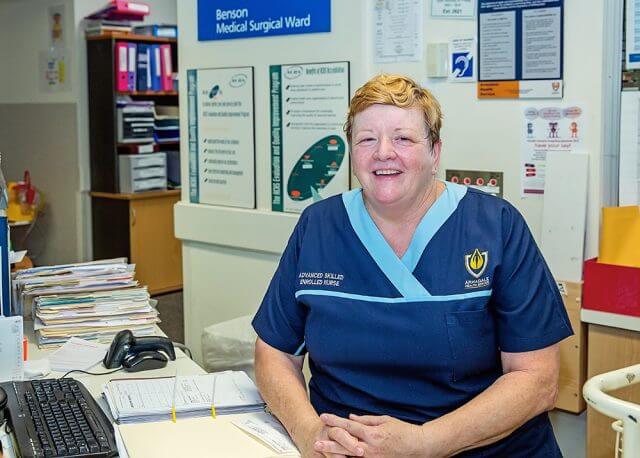
Working in palliative care is not an easy job but Armadale Health Service nurse Shona Fowler said it is an honour to be with people when they are dying. Robyn Molloy spoke to her about her work.
Shona Fowler remembers wanting to run when she first found herself working in palliative care and having to talk to family members about the inevitable, but now helps others with the difficult area of nursing.
Her efforts have been recognised and she is a finalist in the Excellence in Enrolled Nursing of the WA Nursing and Excellence Awards.
“It is difficult but it is really good to make sure your patients are comfortable and families know what is happening, just by talking to them,” she said.
“Some people say it is an honour to be with people when they are dying and it is like that, just to make their journey more comfortable.”
Ms Fowler, who splits her time between the Benson Ward and palliative care nursing, said it took a while to feel comfortable in the role.
“You just can’t go in and start talking to families,” she said.
“I mean the first time I spoke to a family I went ‘oh god where’s the door, let me out of here’.
“So you gradually build up and you learn to read the families.
“You know what you can say and what you can’t say and how to approach them because everybody is different so you learn how to approach them differently.”
Ms Fowler, who does bedside education and one-to-one education, said learning the ropes takes time and the reality is much different to a text book.
“You can read it in a book, how to talk to a family but if you have a family that might be a bit confrontational, then you have to sort of find your words to get the right ones,” she said.
“If someone is having difficulty I will go and help them.
“I let all the new staff know that if they have any problem on the ward I am available to help.”
Ms Fowler, who has worked in palliative care for about 10 years, said it was quite misunderstood.
“People in palliative care are normally afraid of palliative care,” she said.
“Some people, when you mention it, they think it is death straight away.

“But once you explain how it works, then some people think ‘oh, palliative care they will knock them off straight away’.
“A lot of people are palliative but they are not dying, it is symptom control.
“If they have cancer or a life threatening illness it is controlling their symptoms.
“It does not prolong death but it also doesn’t hasten it.”
“Unfortunately the community and some medical staff are afraid of palliative care.”
Ms Fowler said one of the reasons for her award nomination was because she instigated the refurbishment of the palliative care lounge at Armadale Kelmscott Memorial Hospital.
“It was a really horrible old room, it was stark white and the furniture was disgusting,” she said.
“You take people there who have patients that are probably dying and it was just a really horrible room.
“So we got a new lounge, got it repainted, curtains and pelmets and just made it nice and warm. It is now a nice warm atmosphere for them to go into, in which they can retreat from the bad parts of it.
“I am quite passionate about palliative care and like to see that the patients and the relatives are cared for properly.”
Finalists
Five staff from Armadale Health Service have are finalists in the WA Nursing and Midwifery Excellence Awards run by the WA Health Service.
Clinical nurse educator Dennis Hammond and Clinical nurse specialist in intravascular service Elsie Joseph have been shortlisted for the Excellence in Registered Nursing category
Belle Sexton is a finalist in for Excellence in Midwifery, Shona Fowler for Excellence in Enrolled nursing and Casey Light for Excellence in Research.
Dr Susan Slatyer, who works at Curtin University and Sir Charles Gairdner Hospital, is also a finalist nominated for an Excellence in Research award.
Coordinated by the Department of Health, winners will be announced on May 7.













